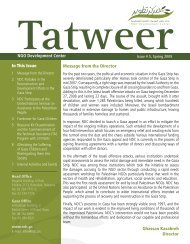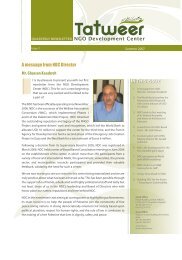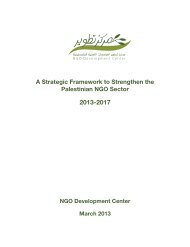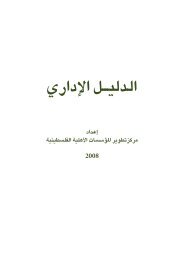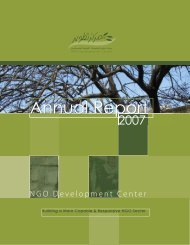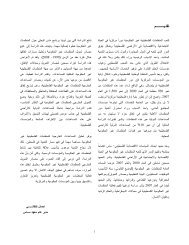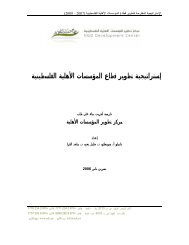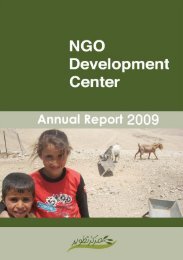Tracking External Donor Funding.pdf - NDC
Tracking External Donor Funding.pdf - NDC
Tracking External Donor Funding.pdf - NDC
You also want an ePaper? Increase the reach of your titles
YUMPU automatically turns print PDFs into web optimized ePapers that Google loves.
esearch could be fed back into the policy making<br />
machine and, hopefully, allow for more relevant and<br />
effective policy-making in the future.<br />
Furthermore, such a database could provide an important<br />
source of institutional memory for the NGO sector. It<br />
would allow PNGOs to track, more effectively than<br />
before, their past activities and how their objectives and<br />
structure has changed over time. Perhaps more<br />
importantly, this information could then be compared to<br />
similar organizations and used to learn from the<br />
successes of other PNGOs. Improved access to data<br />
could also allow for more effective and relevant project<br />
planning. Likewise, the collated data and information<br />
could be used to educate and train incoming staff, not<br />
only to help create a cohesive organizational structure<br />
and a common understanding of the organizations role,<br />
but also, to educate staff in past mistakes and lessons<br />
learned.<br />
4.4 Evaluation of the Proposal by Key<br />
Stakeholders<br />
On November 18th, 2009, a focus group was held at the<br />
MAS Institute to discuss this proposal. Attendees<br />
included Representatives from the MoP PAMS<br />
department, the World Bank and the Local Aid<br />
Coordination Secretariat as well as a small number of<br />
PNGO donors. We asked them if they thought the<br />
database was relevant, whether it endangered donors or<br />
their local partners and whether real implementation was<br />
feasible.<br />
Those in attendance agreed on the utility of such a<br />
database. However, it was argued that the peculiarities of<br />
the occupation would render mandating the use of the<br />
database nearly impossible. INGOs and donors located in<br />
Jerusalem are not required to register with the PA MoI<br />
nor do those headquartered in the rest of the WB&GS.<br />
As the PA’s authority does not extend to East Jerusalem,<br />
tracking these institutions would prove difficult.<br />
Moreover, donors are encouraged to headquarter in<br />
Jerusalem, as opposed to Ramallah, in order to receive<br />
work permits from the Israeli Government.<br />
Consequently, publically disclosing the whereabouts of<br />
their work may endanger their legal status. Without the<br />
PA being able to mandate the use of the database to all<br />
PNGOs and INGOs, the data that it would collate may<br />
not be relevant to either policy makers or development<br />
professionals.<br />
During the focus group concerns were also raised over<br />
whether the PA was ‘trust worthy enough’ to be given<br />
access to the financial data of the nongovernmental<br />
sector. The rocky relationship between the PA and<br />
PNGOs culminating in the 1999 ‘public fight’ between<br />
the two, was cited as a reason and justification for the<br />
nongovernmental sector maintaining its independence<br />
from central authorities. Others argued that, regardless of<br />
the performance of the PA, it has a right to know, and<br />
that INGOs and international agencies should not be<br />
choosing when they should or shouldn’t be acting in<br />
accordance with Palestinian law or the principles of the<br />
Paris Declarations. It should be noted that it is not only<br />
the PA that poses a potential threat to PNGOs. In the<br />
aftermath of the September 11th attacks in New York, a<br />
number of NGOs from the region have come under<br />
intensive scrutiny for their supposed or possible links to<br />
organizations or individuals designated as terrorists by<br />
the US Government. Following the closure of a number<br />
of high profile organizations for precisely this reason,<br />
PNGOs are much more cautious about revealing the<br />
sources of their finances.<br />
The proposed project would depend on securing<br />
adequate funding for it. At present, funding for PAMS is<br />
insufficient to fulfill its stated mandate. Further<br />
extending the scope of that mandate or creating an<br />
entirely new data collection system, as is being suggested<br />
here, would require a significant increase in funding for<br />
PAMS. It may well be the case, however, that the<br />
changes in funding priorities that resulted from the<br />
PRDP and the Paris Declaration would allow for funds to<br />
be allocated to such a project.<br />
64


